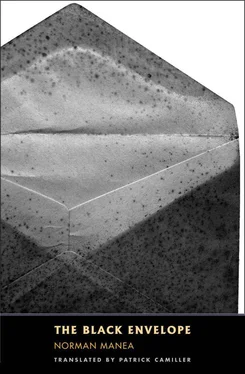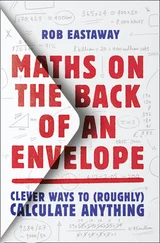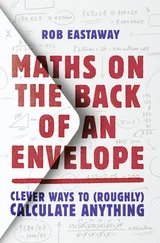“The population first appeared with Bronze Age civilization. Waves of migrating peoples. . war with the Ottoman Empire. . rulers from the Greek aristocracy in Istanbul. We are in the proximity of the capital, which has a density of more than ninety inhabitants per square kilometer. Life expectancy at birth: sixty-seven years.”
The stewardess, without moving, watches and waits for her client — the elegant senator, pastor, lord, butler, or whatever he is. Wavy white hair, a narrow wrinkled brow, pink complexion, moist eyes, large ears, protruding nose, slightly open mouth, starched collar, dark-red tie, lips measuring out soundless words. .
Not a sound. Smooth silent flight. Like movement on the spot, in the belly of a silver whale, stone-still in the great aquarium of the sky. The tray with juices, aphrodisiacs, and poisons. White green yellow glasses, but the man from Mars does not notice. The mannequin keeps leaning over, with her naked breasts on the tray and that lightbulb in the middle. .
The man with a mustache on the pensioner’s right cannot take any more. He pulls a yellow square from the pile of cards on his table, holds it up to view so as to jolt the tourist awake, and then turns in irritation to his subordinate.
“He can’t hear a thing, girl, and he’s left his batteries at home! I’m telling you: his hearing aid isn’t working. And God knows why, kiddo, he’s on a diet; even tits are out.”
But the gentleman does stir and tries to fix the tiny transistor earpieces, to take off the headphones and put on the earpieces. And he does see the bust, yes, he finally notices the statue of Aphrodite— and, of course, he is very interested, he really is; there is a dry gulping sound in his throat, viscous saliva, strangled mumbling, the snake-like tie, and again the soundless battle of the crustacean mouth, until his neighbor understands the command and conveys it to the mannequin, who by now is standing paralyzed, with her breasts on the tray, deafened by the shouts of the man with the mustache. Only she appears to hear them, while the passengers remain impassive and seemingly unaware of anything at all.
“You load of dolts!” shouts the accompanying agent, not just to his guest, but also to the unfamiliar world that he represents. “You’re blind, blind as hell! You blind dolts, you stuff yourselves with all that information, all those relays and rockets. But you don’t understand a thing! And me? And us? Speechless, sir, quite speechless! The angels have taken away our voice. My bosses have taken mine as well as Lieutenant Aphrodite’s, as you can see. . And all our sleeping people are just waiting for you to come and save them! You, with your flying fortresses and your arrogant chewing gum.”
The foreigner nods pastorally, without understanding a word. Yes, the foreigner does look like a pastor. He looks with disappointment at the defective earpieces, which he checks once more without success. The little capsules are now hanging on a golden chain over his impeccable silk shirt front. He smiles with satisfaction and looks contentedly at the glass of milk lying on his table. Milk is what the missionary ordered. Milk is what the maternal agent Aphrodite has given him, and now she is agilely working to point her completely available body toward him — her glossy breasts, her electric button, her hips of gold. The customer smiles as he puts his hand out for the glass of milk. Just as he touches it, the alarm sounds in the aircraft. Gunfire is shaking the walls, the bodies, the seats — enough to raise the dead. An infernal alarm, the end of the world.
Anatol Dominic Vancea Voinov jerks dizzily to stop the inferno. The telephone is right beside his bed. The alarm clock right beside his bed. No, that isn’t it. His hand is trembling as it searches for buttons, cutouts, keys. The bell. . that long tinkling of metal wings, the air, the asylum bells sounding reveille. Yes, it is morning; the windows are shaking from the louder noise of the new day.
TOLEA HAD LEARNED FROMhis friend and neighbor Gafton that redundancies were likely in many enterprises. He shrugged his shoulders apathetically. Then he heard that as much as 40 percent of office staff would be affected. He smiled and switched on the transistor lying on the desk of his colleague Gina: Monte Carlo, his favorite station.
Then someone started the rumor that such-and-such a comrade director had already been replaced by another comrade director; that certain networks were being dismantled and new links and combinations established. He looked on impassively at the hysterical reactions of his colleagues at the Hotel Tranzit: the bookkeeper, the barman, the switchboard operator, the cleaning woman were all glued to telephones trying to discover the ins and outs. He raised his eyebrows, in a superior kind of way, when his four-eyed colleague told him the criteria that would be used for layoffs. He merely lifted himself slightly on tiptoe, straightened his colleague’s loose tie beneath his made-in-China shirt collar, and went to the window to contemplate the spring fever.
Gina tried to distract him by reading something from the morning papers.
“Listen to this story that happened yesterday. ‘On the pretext that in privately owned apartment number … on the ground floor of the building there was a dog … or several dogs … and a cat … or several cats.’ Well, what do you say?”
Stretched out on the armchair, with his feet perched American-style on another chair, his head on the ceiling, his eyes shut, Tolea did not appear to have heard. Was he meditating, or calculating, or reminiscing? He flicked away the alarming news, like some annoying seasonal insect.
“There now, do you hear? Pretexts. Where are dogs and cats going to have to live now? In the forest, in the wilderness? What do you say? Isn’t it well written? Listen: only in forests, on mountaintops and ocean reefs. What are those reefs supposed to be? Yes, it’s a strong article. I wonder how it was published.”
It may have been at that moment of just-listen-to-thisness that the strange idea flashed into Tolea’s mind. The idea of playing a trick— something the public would not expect, something that would liven him up himself. For he was bored: Professor Voinov was bored to death.
In a world where everything seems programmed, even chaos, chance, or surprise, you’ve got to defy logic and bewilder people. You’ve got to make the fools believe that you control secret links to which they have no access.
Thought after thought kept passing through the skull of receptionist Anatol Dominic Vancea Voinov, known as Tolea; his brain circuits were working nonstop, in perpetuum mobile , and without a doubt it would have been possible to pick up signals from them. Especially as spring — oh yes, it was a real illness, spring, a real onslaught. At last something real and powerful, for which the numbed mice no longer showed any reflexes.
“The instigators — tenants from the block! I ask you!”
The receptionist seemed to have awoken.
Suddenly the word “instigators.” Perhaps he had remembered his father …
And well, the heir will demonstrate that when all the games appear lost, a new one has to be invented, however bizarre it might seem, however futile it might be. So we are going to do things the other way round, mon père; , completely the other way! We’re not going to commit suicide, mon père; no, no, we won’t follow your scenario. We’ll just study it, act it, face up to it, that’s all. Otherwise, without a mission impossible, we won’t hold out against the spring or the boredom. Not even against the tedium of multilateral sycophancy.
Tolea jumped up from the armchair, alone at the center of the world, on the great stage with nobody else on it. Personne, niemand, nikovo .
Читать дальше












